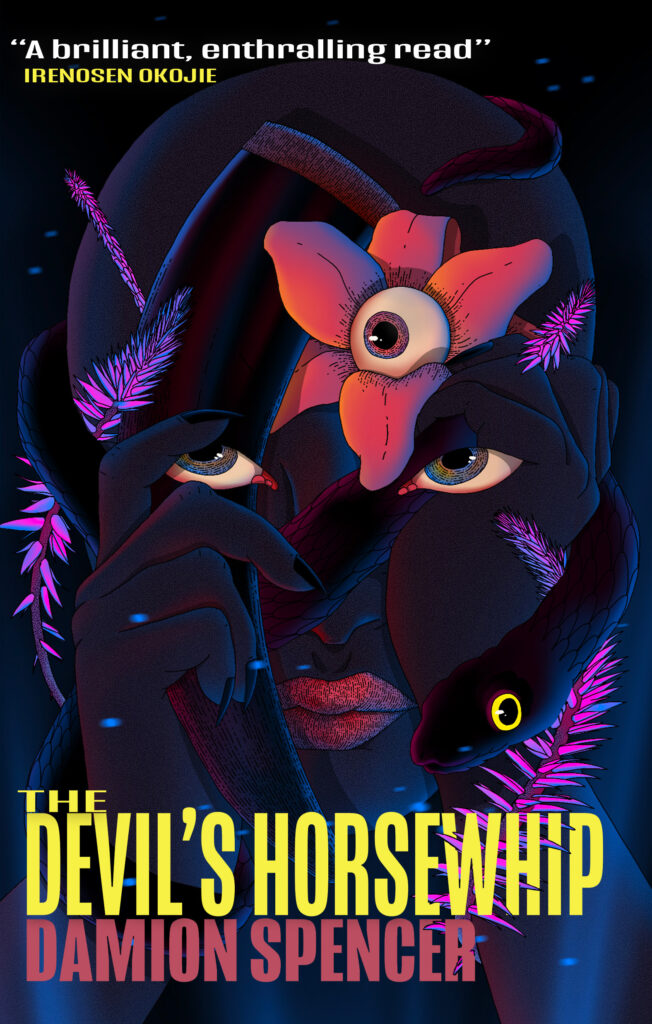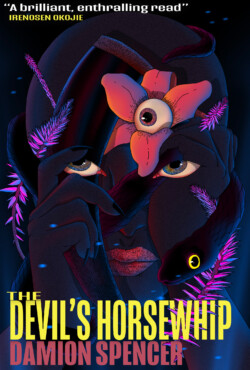Barbican First Interview: Damion Spencer
May 5, 2025

May is here that means another of our Barbican First titles is about to release! We have been celebrating our new series of debut, short fiction by interviewing these writers to help you get to know them and their books a little better, along with their experience of the publishing process.
This month sees the release of The Devil’s Horsewhip, a ‘novel-in-stories’ by Damion Spencer that explores the themes of death, post-colonialism and Caribbean folklore.

Tell us a little about yourself: did you read a lot as a child? Have you always wanted to be a published author? How did you begin as a writer?
Damion Spencer: I had a very happy boyhood, but it was splintered, meaning I lived everywhere and nowhere. So, reading has always been a companion for me during my many transitions. I’ve always loved stories, especially those rooted in oral traditions, but my interest in writing started in my early teens when I found a treasure trove of old text and literature books in a bed trunk at my mother’s house (mainly my siblings’ unreturned library and high school rental books). Books like C. Everard Palmer’s A Cow Called Boy and My Father, Sun-Sun Johnson, The Pearl by John Steinbeck and Sam Selvon’s Brighter Sun. Mind you, these books were riddled with holes from oothacae and termites, so there was some embellishing until I could confirm the original stories at the library. At the time, I didn’t realise that I was cultivating writing skills that would see me creating original skits for high school plays and award-winning productions for the Jamaica Cultural Development Commission when I worked as a primary school teacher.
What previous experience do you have with publishers? How did you find out about Barbican Press and the Barbican First series?
DS: Not much. My debut was scouted by the lovely Dr. Maggie Hamand. I met her at the University of Hull on the MA Creative Writing programme. We video-called after Hull, and she introduced me to the Barbican First series. She told me I was one of the first people she thought about for the series and I can’t thank her enough for championing my craft.
Did you send your manuscript to other publishers? What made Barbican Press stand out?
DS: There’s a saying in Jamaica that goes, di fos waata hag si him wash. I had a positive experience with Dr. Hamand and Dr. Goodman reviewing my writing, and when they agreed to publish me, it didn’t need much convincing.
How have you found the literary world so far? Did you have any expectations beforehand and, if so, how has the process compared?
DS: My initial plan was to submit my work to writing prizes because the stakes are high in these competitions, but I was more concerned with the visibility that comes with being placed on the long and shortlists and if you’re awarded a top prize. I’ve met many talented writers and received significant publication credits and recognition from some of the most prestigious literary journals, magazines and prizes. Being on the radar of the Brooklyn Caribbean Literary Festival, The Caribbean Writer, The Commonwealth Short Story Prize and Wasafiri before having my debut out in the world have far exceeded all my expectations.
What support have you received from Barbican Press regarding the publishing process?
DS: Barbican Press has been very generous. There has been consistent communication since the contract signing, and it has been an invaluable learning experience about the rudiments of the publishing industry. I’ve been exposed to the unseen production side of book publishing. Working with the public relations team to develop materials to pitch to booksellers, learning about typesetting, creating a book cover brief, and polishing the book until it was ready to go into the world were all collaborative initiatives.
Do you think the Barbican First series has helped get the best version of your book published?
DS: Indeed. I was stuck writing the wrong book before penning my debut. Working with Barbican Press, which is known for its strong editorial focus and commitment to protecting the writers they publish, we produced a very high-quality work without trading off on authenticity. I’m blessed to have entered traditional publishing with my best foot forward. I’m more confident returning to my memoir with all the new skills I’ve garnered. The world knows who I am now, and that’s a necessary build-up for unknown writers before dropping a memoir on the readership.
What inspired you to write The Devil’s Horsewhip?
DS: A health crisis and the loss of my mother and another close relative during the COVID-19 pandemic led me into a period of constant preoccupation with death. From a hospital bed, while pondering my mortality, I started penning the sheer loneliness I felt. So, in a way, this book started as a way to heal and later developed into this body of work exploring death rituals, mental health and Indigenous healing practices.
What authors and books would you compare yours to? Were there any in particular that inspired your book and/or writing style?
DS: Jonathan Escoffery’s If I Survive You, which happens to be a debut of linked short stories, is comparable to The Devil’s Horsewhip in areas such as a protagonist trying to find a sense of belonging during a widespread crisis and the fact that the book is hard to be placed genre-wise. Is it autobiographical, fictional, etc.? There are also explorations of settings both in Jamaica and elsewhere. The writing is experimental. There’s usage of the Jamaican language and a focus on similar themes like identity and discrimination.
Then there is For Such a Time As This by Shani Akilah, another short story collection examining the vestiges of colonialism that persist in modern workspaces and a closer look at the isolation caused by the COVID-19 pandemic. Just like The Devil’s Horsewhip, Shani’s book has a powerful display of human relationships, a quality that renders most books timeless.
The Dangers of Smoking in Bed by Mariana Enríquez is a gripping collection of unsettling tales drawing on surreal writing that requires a suspension of disbelief in readers, as within The Devil’s Horsewhip. Both projects utilise a deft hand on superstitions, legends and folklore that are culturally specific to the settings explored. Despite unflinching accounts of violence against women and the macabre, the stories still manage to provide readers with a well-rounded reading experience that traverses the whole range of human emotions.
Two other authors who inspired me while writing my book were Kevin Jared Hosein and Sharma Taylor. After reading their short stories ‘Passage’ and ‘Son-Son’s Birthday’ [respectively], I was empowered to incorporate my background in psychology in my writing, as Kevin’s science background is evident in his story, especially in the way he effortlessly classified the setting’s fauna and flora. Sharma’s unapologetic use of the Jamaican language is a testament that there’s a place for every voice, and we should not be swept up in the tide of ‘othering’ or any attempt to censor our stories to appeal to a readership with an established taste but to be authentic.
Bested only by Claude McKay’s ‘Truant’ in my eyes, ‘Passage’ and ‘Son-Son’s Birthday’ remain two of my favourite short stories.
The Devil’s Horsewhip is a ‘novel-in-stories’ that draws on Caribbean folklore, rituals and superstitions around death. What do you think readers will find appealing about your stories and characters?
DS: Both long-time lovers of Caribbean literature and newcomers will be treated to many new Jamaican settings, new ghosts (without being heavy-handed with the spoilers) and a refreshing look at the influence of superstitions and folklore in today’s society. I’m excited to see how readers will receive the oral traditions of the Caribbean in writing because The Devil’s Horsewhip is sure to make griots out of them.
You have been described as “a voice to look out for”. Do you think The Devil’s Horsewhip is a good entry point for readers wanting to explore contemporary Caribbean literature? How does it stand out against other titles?
DS: Certainly! The Devil’s Horsewhip aims to orientate readers about how Caribbean people carry and reproduce the landscape of home. It’s a true gateway into Caribbean living, and readers can expect to experience the shifting environment, what is lost and what persists even today. The Caribbean literary canon is not easily delineated, and it shouldn’t be. We are called to retell our stories and share our imaginations in diverse ways regardless of our languages, traditions and territories. This is one of our most celebrated liberties. I write with that freedom to memorialise the past, bear witness to what is happening around us, and dream of a deserving future.
I’m a huge fan of Irenosen Okojie, and she would have blessed my writerly heart by just reading my work, but giving such a beautiful endorsement is something I’ll cherish forever. However, having my voice praised in such a way for my debut is both terrific and terrifying. On the one hand, I believe The Devil’s Horsewhip has its place in the world, and I’m just happy to share the space with all the luminaries in the Caribbean literary canon, most of whom have influenced my craft. On the other hand, in a world fuelled by platitudes and erasure, stories about everyday Caribbean folks are often overshadowed by beach kitsch and island tropes.
What do you hope readers will take away from the book?
DS: I simply want people to call the names of characters who are vulnerable, victimised and require help. Hopefully, this will translate into everyday life. The world could use that right now. Too many people are overlooked, forgotten and ignored. That’s all.
What advice would you give to aspiring writers looking to get published?
DS: Writers aren’t short on advice these days. Maybe there are too many to navigate or remember. So, instead, I’ll share a few reminders and a quote that are found on my vision board:
- You only need a pen and paper to write.
- A book is a conversation, and it takes at least one other person to have a conversation, so quit talking to yourself if you want to write that book.
- “If you’re going to be a writer, you have to be one of the great ones, and they don’t make them anymore. […] After all, there are better ways to starve to death” ~ Gabriel García Márquez
What advice would you give to your younger self?
DS: Try not to dread this amorphous thing called the future. Enjoy the good days, and know that dark and cold days can be burned for heat and light later.
What is your favourite book? (Or what book changed your life?)
DS: My reading appetite isn’t that small. I couldn’t possibly choose just one book. If we consider reading in the way we eat for sustenance (which it probably is), Cane by Jean Toomer, Haruki Murakami’s First Person Singular, or Pieces of a Man, which is an assortment of classic black male writers like Claude McKay, Paul Laurence Dunbar and Charles W. Chesnutt, are all perfect to start the day. Then Toni Morrison’s The Bluest Eye, Kei Miller’s Augustown, Black Leopard, Red Wolf by Marlon James, and Osamu Dazai’s No Longer Human are the kind of pièces de résistance I savour, revisit and carry with me like leftovers to enjoy later. And because I don’t have a sweet tooth, Elizabeth Strout’s My Name is Lucy Barton, Convenience Store Woman by Sayaka Murata, A Small Place by Jamaica Kincaid, and anything from Paulo Freire are some of the most sobering reads I enjoy before bed. It is a way of ensuring that my dreams are informed by reality.
What are you currently reading? What’s on your TBR?
DS: I’m having a go at Shakespeare’s sonnets, this comes on the heels of reading What A Mother’s Love Don’t Teach You by Sharma Taylor (one of her main characters is Apollo). My TBR pile is no longer what the Japanese call tsundoku. I only have Lisa Allen-Agostini’s Death in the Dry River, Volumes 35 and 37 of The Caribbean Writer and The Luckiest Thirteen: A True Story of a Battle for Survival in the North Atlantic by Brian W. Lavery left to read. Brian’s book will accompany me on a mountain hike in early April for a bit of forest bathing if the weather allows it.
Do you keep books after finishing or pass them on to others?
DS: My books stay with me, is really what I want to say, but I’ve moved house a few times and with books being heavy, I was forced to donate to other bibliophiles.
How is your bookshelf arranged?
DS: Usually, on my top shelves, I have books that are a part of my ‘read authors I know’ collection. This category is reserved for creatives who are alive, actively writing and know me personally. Then TBRs, work resources and my favourite books follow, and finally, books for my kids fill the shelves they can access. Also, my books are arranged according to spine colour as best as possible.
Hardback or paperback?
DS: My wife buys our books (she’s a far more prolific reader than I am), and she told me many years ago that I prefer hardbacks, so I’ll go with hardbacks. However, lately, we’ve been opting for reading options with more eco-advantages. Trust me, it is like spinning plates but we’re saving the planet.
Physical, eBook or audiobook?
DS: Physical, of course, but not every desire translates well in reality. I know that at some point, holding a book and ruffling its pages will only be a treasured memory.
Folded page corners: acceptable, or book sin?
DS: I aim to preserve the books that are now in my care for my children or someone in my future lineage who might share my taste in books. Therefore, bookmarks are handy, and only my registered inkan (a katakana representation of my name enveloped in a tiny oval shape) is stamped on the book block and the title page. I’m not recommending that other readers strive for impractical measures to keep books minted or hinder the enjoyment of their reading experience, but come on, some of these practices crossed the line and are up there with desecrating a work of art.
What about writing in books?
DS: I’ve started fights for less than that, but people choose to engage with books in different ways. We might not like their book etiquette, but it’s their choice; we can all decide how to ‘own’ or ‘love’ our books (I still think we should fight these people).
What’s next for Damion Spencer? Are you working on another book?
DS: I was gifted three bookmarks by a lovely librarian ‘for the books you’ll write,’ she told me, and I posted them on social media telling everyone that I’ll be busy writing those books. So, I’m currently working on two more books. I’m almost done with my memoir and working on an Anansi-inspired SF for young readers.
And finally, if you were not writing books, what would you be doing?
DS: I’m a storyteller. Writing is just one way to share a story. If I didn’t write (which is unimaginable), I’d probably paint, play the drums, lead melodramas, do traditional African or Caribbean dances, sit around some fireplace sharing folktales or continue teaching. I’m always teaching, but most writers are creative polymaths, so don’t believe them if they say they can’t see themselves doing anything else but writing because they usually excel at many other things.
👉 Follow Damion on Instagram and X, and check out his website.
Many thanks to Damion for giving us his time and insights. The Devil’s Horsewhip will be published on 15th May in paperback and eBook formats and is available to pre-order now from your local Amazon site, Waterstones and other good places where books are sold.
Check back here soon for our final Barbican First Interview. In the meantime, be sure to follow us on Substack, Instagram, Threads, Bluesky, Facebook and X to keep up to date with our latest news, or consider subscribing to our free newsletter.



